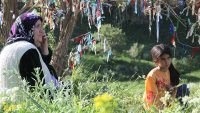by Clarence Tsui
The Bottom Line
Accessible narrative and beautiful visuals belies a fiery account of political suppression of Turkey’s Kurdish minority.
Venue
Press screening, Istanbul International Film Festival (National Competition), Apr. 14, 2014
Director
Hüseyin Karabey
Cast
Feride Gezer, Melek Ülger, Tuncay Akdemir, Muhsin Tokcu
 Hüseyin Karabey’s road-movie follows a Kurdish child and her grandmother’s desperate task to find a gun, which could buy their loved one free.
Hüseyin Karabey’s road-movie follows a Kurdish child and her grandmother’s desperate task to find a gun, which could buy their loved one free.
Compared to his festival-garlanded 2008 feature film debut My Marlon and Brando– in which a Turkish actress braves war and all to find her Kurdish lover in northern Iraq– Hüseyin Karabey’s second outing seemingly offers a less solemn and more crowd-pleasing premise. Revolving around a girl and her grandmother’s travels and travails to find a much-needed item– in this case, the very masculine symbol of a gun– Come to My Voice could easily play well with more mainstream audiences who, years before, have propelled similar lost-and-found films like Children of Heaven or The White Balloon to wider prominence.
After its world premiere at the Berlinale’s teen-oriented Generation 14plus section in February, Come to My Voice has just scooped the audience-voted People’s Choice award at the Istanbul International Film Festival, in addition to a jury-determined Best Music prize. While boasting Feride Gezer’s measured performance as a stoic matriarch and Melek Ülger’s vibrant turn as the wide-eyed and inquisitive child, the film also provides DP Anne Misselwitz’s vivid visual showcase of sweeping rural landscapes, awe-inducing mountains and plains very much dwarfing the protagonists and most of their much-suppressed Kurdish compatriots.
While the dynamism renders Come to My Voice accessible to all ages alike, it also belies the film’s sharper political edge than Karabey’s previous film. The fury shown on the director’s non-feature projects during the past five years– the murdered Istanbul-based Armenian journalist Hrant Dink (No Darkness Will Make Us Forget, 2011), the portmanteau about solitary-confined prisoners in Turkey (F-Type Film, 2012)– is manifested full-blown here as Berfe (Gezer) and Jiyan (Ülger) contends with brutal Turkish military commanders and their corrupt underlings, and also crooked village headmen, callous militiamen on their own Kurdish side.
In fact, it’s an unholy alliance between bad elements from both sides that kickstarted Berfe and Jiyan’s ordeal. Raiding a Kurdish village after a tip-off, a Turkish military unit fails to find the weapons suggested by the informer; enraged, the captain (Nazmi Sinan Milici) orders all male villagers to be taken away for detention and questioning at the barracks, and told the remaining folk – elderly and children mostly – they would have to hand over 15 rifles and 20 guns within a week in exchange for the release of the men.
As Berfe’s initial attempts to get her son Temo (Tuncay Akdemir) flounders (the old musket she brought in was angrily dismissed by the captain) and Jiyan more than eager to contribute to her father’s freedom (she runs around collecting toy guns, sometimes even in the face of Turkish soldiers), the pair begin their long journey to look for a firearm to submit to the army. Living up to the folktale being told in installments throughout the film – about a fox’s long-winded efforts to repair his beautiful but broken tail – Berfe and Jiyan’s struggle is drawn-out, as requests for help are repeatedly rebuffed by the community chieftain, smugglers and finally even relatives living in town.
In the meantime, nearly every one strays beyond the pale to protect themselves or capitalize on the crisis; a sergeant (Savas Emrah Özdemir) offers to sell guns to villagers through a middle man, both of which skimming quite a bit off these deals. Past woes are revealed through details of Berfe’s struggling life of poverty, persecution and being rendered a pariah by a village leader whose advances she spurned. And then there are those who are supposedly “our boys”: As Berfe and Jiyan make their way through rebel-held territory, slacking gunmen just sit in the shade as they tease the women that they are sure “Temo is being beaten in prison– everyday”.
The only kind and kindred souls the pair would eventually run into are three blind storytellers (played by real-life “dengbej” Muhsin Tokcu, Ali Tekbas and Kadir Ilter), whose willingness to play foil at checkpoints– where they are still hassled by Turkish officers for being “guerilla propagandists”– would prove to be crucial to Berfe and Jiyan’s passage back home. It’s perhaps not coincidental that storytellers– Berfe, the three wise men, and other elderly villages offering their own recollections of life– are central to Come to My Voice: The oral tradition has always been the key to resistance against oppressors who could burn manuscripts but not erase memories. Among Kurds, passed-down parables are political in itself; with his beautifully-rendered film, Karabey has joined in this ever-louder chorus articulating the anguish of a suppressed minority.
Venue: Press screening, Istanbul International Film Festival (National Competition), Apr. 14, 2014
Production Company: Asi Film, Neue Mediopolis Filmproduktion, EZ Films
Director: Hüseyin Karabey
Cast: Feride Gezer, Melek Ülger, Tuncay Akdemir, Muhsin Tokcu
Producer: Huseyin Karabey, Emre Yeksan
Screenwriter: Huseyin Karabey, Abidin Parilti
Director of Photography: Anne Misselwitz
Editor: Baptiste Gacoin
Music: Ali Tekbas, Serhat Bostanci, A. Imran Erin
International Sales: EZ Films
In Kurdish and Turkish
105 minutes
via Come to My Voice (Were Dengê Min/Sesime Gel): Istanbul Review – The Hollywood Reporter.
